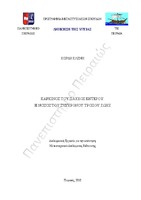Καρκίνος του παχέος εντέρου: η νόσος του σύγχρονου τρόπου ζωής
Colorectal cancer: the disease of modern lifestyle

Προβολή/
Θεματική επικεφαλίδα
Έντερο, Παχύ -- Καρκίνος ; Cancer -- Research ; Colon (Anatomy) -- Cancer ; Καρκίνος -- ΈρευναΠερίληψη
Ο καρκίνος του παχέος εντέρου είναι ένα παγκόσμιο πρόβλημα υγείας με αυξανόμενη επίπτωση τόσο στις αναπτυγμένες όσο και στις αναπτυσσόμενες χώρες, κυρίως λόγω των αλλαγών στις συνήθειες ζωής, καθώς και της γήρανσης και της αύξησης του παγκόσμιου πληθυσμού. Μόνο για το 2008, διαγνώστηκαν 1.23 εκατομμύρια νέες περιπτώσεις καρκίνου του παχέος εντέρου παγκοσμίως, ενώ ο καρκίνος του παχέος εντέρου είναι ο τρίτος συχνότερος καρκίνος στους άνδρες (663.000 νέες περιπτώσεις, 10% επί του συνόλου των καρκίνων) και ο δεύτερος συχνότερος στις γυναίκες (570.000 νέες περιπτώσεις, 9,4% επί του συνόλου των καρκίνων). Ο καρκίνος του παχέος εντέρου ευθύνεται για 600.000 θανάτους που καταγράφηκαν το 2008 παγκοσμίως με περισσότερους από τους μισούς θανάτους να σημειώνονται στις ανεπτυγμένες χώρες (Globocan IARC 2008, Parkin et al 2002). Υπολογίζεται ότι ευθύνεται για το 8% των θανάτων από καρκίνο παγκοσμίως, καθιστώντας τον την 4η πιο συχνή αιτία θανάτου από καρκίνο. Ο καρκίνος του παχέος εντέρου προσφέρεται για την εφαρμογή προγράμματος προ συμπτωματικού ελέγχου, καθώς αναπτύσσεται συνήθως σε έδαφος αδενωματώδους βλάβης μετά την πάροδο μεγάλου χρονικού διαστήματος, ενώ η έγκαιρη διάγνωση της νόσου σε αρχικό στάδιο βελτιώνει καθοριστικά την επιβίωση των ασθενών. Σημαντικό ρόλο στην εμφάνιση της νόσου παίζουν γενετικοί παράγοντες καθώς έχουν αναγνωρισθεί κληρονομικά σύνδρομα, ενώ και οι περιβαλλοντικοί παράγοντες και οι προσωπικές συνήθειες συμβάλλουν καθοριστικά στην εμφάνιση της νόσου. Υπάρχουν ποικίλες διαγνωστικές εξετάσεις για την έγκαιρη αναγνώριση των αλλοιώσεων, εργαστηριακές και απεικονιστικές, με διαφορετικά χαρακτηριστικά, ευαισθησία, ειδικότητα και κόστος. Η θεραπευτική προσέγγιση της νόσου εξαρτάται από το στάδιό της και μπορεί να περιλαμβάνει χημειοθεραπεία, χειρουργική αφαίρεση, ακτινοθεραπεία ή συνδυασμούς αυτών. Ένα πρόγραμμα προ συμπτωματικού ελέγχου για τον καρκίνο του παχέος εντέρου, εάν εφαρμοστεί ακολουθώντας τις επίσημες κατευθυντήριες οδηγίες, οδηγεί σε μείωση της επίπτωσης της νόσου με την έγκαιρη διάγνωση και θεραπεία των προ καρκινικών αλλοιώσεων, μειώνοντας έτσι σημαντικά τους θανάτους από τον καρκίνο του παχέος εντέρου. Οι χώρες που εφαρμόζουν οργανωμένα προγράμματα παρουσιάζουν την υψηλότερη συμμόρφωση του πληθυσμού και κατά συνέπεια περισσότερα οφέλη από τον έλεγχο, ενώ σε χώρες με ευκαιριακά και πιλοτικά προγράμματα προ συμπτωματικού ελέγχου η συμμετοχή εξαρτάται από το επίπεδο ενημέρωσης και ευαισθητοποίησες του ιατρικού προσωπικού αλλά και του γενικού κοινού. Στην Ελλάδα, τα στοιχεία που έχουμε στη διάθεσή μας δείχνουν την ανάγκη εφαρμογής οργανωμένου προγράμματος προ συμπτωματικού ελέγχου και την αποτελεσματικότερη ενημέρωση και ευαισθητοποίηση του πληθυσμού για την αξία της έγκαιρης διάγνωσης της νόσου. Η οικονομική ανάλυση της εφαρμογής των προγραμμάτων προ συμπτωματικού ελέγχου αποδεικνύει πως το κόστος τους σε σχέση με την αποτελεσματικότητά τους είναι χαμηλό, καθιστώντας τον προ συμπτωματικό έλεγχο για τη νόσο αναγκαίο για τα συστήματα υγείας, ειδικά αν συγκριθεί το κόστος της πρόληψης με το αντίστοιχο της θεραπευτικής αντιμετώπισης της νόσου. Όσο πιο προχωρημένο είναι το στάδιο διάγνωσης της νόσου τόσο μεγαλύτερο το κόστος της θεραπείας και τόσο μικρότερη η 5ετής επιβίωση των ασθενών, δημιουργώντας έτσι την επιτακτική ανάγκη για πρόληψη και έγκαιρη διάγνωση μέσω οργανωμένου προγράμματος προ συμπτωματικού ελέγχου για τη νόσο.


